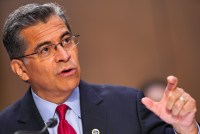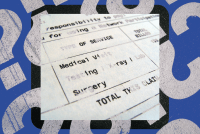Latest Morning Briefing Stories
‘An Arm and a Leg’: How to Avoid the Worst Health Insurance
Listen to a journalist’s first-person horror story on shopping for health insurance — and learn how to avoid the pitfalls.
Becerra Says Surprise Billing Rules Force Doctors Who Overcharge to Accept Fair Prices
The Health and Human Services secretary says the administration has heard complaints from doctors and hospitals about the rules it unveiled for implementing the law to end surprise medical bills. But he says providers who have exploited a complicated system to charge exorbitant rates will have to bear their share of the cost — or close.
Why You Can’t Find Cheap At-Home Covid Tests
You probably won’t be testing everyone at your Thanksgiving table for covid because the tests are expensive and hard to find. Why? The federal government is partly to blame.
‘An Arm and a Leg’: The Insurance Warrior’s Battle Plan
Health care — and how much it costs — is scary. But knowledge is power. Take a master class in winning insurance appeals. In the case of Matthew Lientz, taking on his insurance also meant going up against his employer.
The ER Charged Him $6,500 for Six Stitches. No Wonder His Critically Ill Wife Avoided the ER.
With few options for health care in their rural community, a Tennessee couple’s experience with one outrageous bill could have led to a deadly decision the next time they needed help.
KHN’s ‘What the Health?’: Boosting Confusion
Federal health officials appear poised to extend a recommendation for covid boosters to all adults, following moves by some governors and mayors to broaden the eligible booster pool as caseloads rise. Meanwhile, the Food and Drug Administration finally has a nominee to head the agency: former FDA chief Robert Califf. And Medicare premiums for consumers will likely rise substantially in 2022, partly due to the approval of a controversial drug to treat Alzheimer’s disease. Tami Luhby of CNN, Sarah Karlin-Smith of the Pink Sheet and Rachel Cohrs of Stat join KHN’s Julie Rovner to discuss these issues and more. Also this week, Rovner interviews Dan Weissmann, host of the “An Arm and a Leg” podcast.
Stranded by the Pandemic, He Had Only Travel Insurance. It Left Him With a $38,000 Bill.
Although it’s possible to buy travel insurance that provides some health coverage, the devil is in the fine print. Obama-era laws that prevent refusal of payment for preexisting conditions don’t apply to travel insurance.
Public Opinion Is Unified on Lowering Drug Prices. Why Are Leaders Settling for Less?
Politicians and many health experts have done their best to see the glass half-full in the plan put forward by congressional Democrats and the president. But it’s “a far cry” from what other nations do to rein in drug prices, and polls show most voters demand more protection.
Fabricantes de medicamentos se niegan a ofrecer descuentos a miles de farmacias contratadas por los hospitales, diciendo que el programa ha crecido más allá de su uso previsto.
As Big Pharma and Hospitals Battle Over Drug Discounts, Patients Miss Out on Millions in Benefits
The number of pharmacies dispensing 340B discounted drugs soared to more than 31,000 this year. Drugmakers struck back by halting some discounts. Hospitals say they are losing millions of dollars — and cutting back services to patients — as a result.
Tu gasto de bolsillo en atención médica no debe ser un misterio
Una ley de California firmada por el gobernador Gavin Newsom en octubre puede ayudar a clasificar una maraña de facturas médicas para entender qué cubre el plan de salud y cuándo comenzará la cobertura.
Cómo las comunidades rurales están perdiendo sus farmacias
Las farmacias de las esquinas, que alguna vez estuvieron tanto en las grandes ciudades como en los pueblos rurales, están desapareciendo de muchas áreas del país, dejando a unos 41 millones de estadounidenses en lo que se conoce como “desiertos de farmacias”, sin fácil acceso a las farmacias.
How Rural Communities Are Losing Their Pharmacies
More than 1,000 independent rural pharmacies have closed since 2003, leaving 630 communities with no retail drugstore. As 41 million people stuck in pharmacy deserts make do, the remaining drugstores struggle to survive.
Your Out-of-Pocket Health Care Costs Need Not Be a Mystery
A new California law requires health insurance companies to notify consumers how much remains on their deductibles and how close they are to their annual out-of-pocket spending limits.
KHN’s ‘What the Health?’: Why Health Care Is So Expensive, Chapter $22K
Congress is making slow progress toward completing its ambitious social spending bill, although its Thanksgiving deadline looks optimistic. Meanwhile, a new survey finds the average cost of an employer-provided family plan has risen to more than $22,000. That’s about the cost of a new Toyota Corolla. Alice Miranda Ollstein of Politico, Anna Edney of Bloomberg News and Rebecca Adams of CQ Roll Call join KHN’s Julie Rovner to discuss these issues and more. Also this week, Rovner interviews Rebecca Love, a nurse academic and entrepreneur, about the impending crisis in nursing.
Researcher: Medicare Advantage Plans Costing Billions More Than They Should
Some insurers pocketed ‘eye-popping’ overpayments, billing records show.
Muchos empleadores informaron que desde que comenzó la pandemia han realizado cambios en sus beneficios de salud mental y adicciones. La principal forma fue extender el uso de la telemedicina.
As Workers Struggle With Pandemic’s Impact, Employers Expand Mental Health Benefits
Many job-based health plans broadened their mental health and substance use coverage to make sure workers had the support they needed this year as pandemic stress lingered, the annual KFF survey finds. Also, the proportion of employers offering health insurance to their workers remained steady, and increases for premiums and out-of-pocket health expenses were moderate.
Hormone Blocker Sticker Shock — Again — As Patients Lose Cheaper Drug Option
Kids who need a hormone-blocking drug to delay puberty have lost an off-label option. The nearly identical drug the company still sells costs eight times more.
KHN’s ‘What the Health?’: Compromise Is Coming — Maybe
Democratic negotiators on Capitol Hill appear to be nearing a compromise on President Joe Biden’s social spending agenda, spurred partly by Democratic losses on Election Day in Virginia. Meanwhile, the Supreme Court hints it might allow abortion providers to sue Texas over its restrictive new ban. But the relief, if it comes, could be short-lived if the court uses a second case, challenging a law in Mississippi, to weaken or overturn Roe v. Wade. Alice Miranda Ollstein of Politico, Margot Sanger-Katz of The New York Times and Mary Ellen McIntire of CQ Roll Call join KHN’s Julie Rovner to discuss these issues and more. Also this week, Rovner interviews KHN’s Rae Ellen Bichell, who reported and wrote the latest KHN-NPR “Bill of the Month” feature about an emergency bill for a nonemergency birth.



















